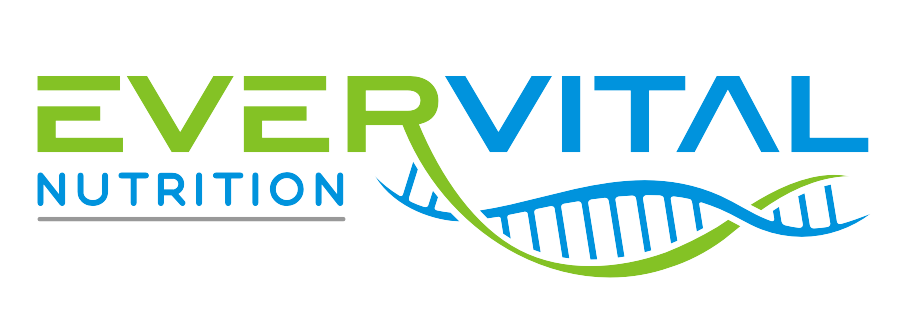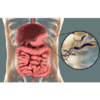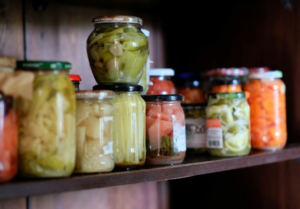
Stomach acid, gastric acid, hydrochloric acid – all of these names refer to the acid that is naturally produced by the parietal cells lining the stomach.
We’ve talked about stomach acid before here and here, so check those out if you haven’t read them yet.
But what does this acid actually do?
HCl’s Role in Digestion
Hydrochloric acid plays an important role in your digestion and immunity. It helps break down protein and allows absorption of essential nutrients, and it helps control harmful organisms: those bacteria, viruses, parasites, and fungi that we’re always talking about.
Without suboptimal levels of stomach acid, aka hypochlorhydria, you won’t digest food properly, especially protein. If this continues, you can develop serious nutritional deficiencies. You’ll also be prone to gut infections, which can cause further damage to your stomach and your entire digestive system.
Your stomach is designed to be acidic for several reasons:
- Stomach acid neutralizes harmful pathogens like parasites, yeast and bacteria that enter the body in food. This happens all the time, even in western countries. All. The. Time. And normally, this is not a problem in a healthy gut because stomach acid will just zap those guys.
But…If stomach acid isn’t present in sufficient amounts to kill off these harmful organisms, they may cause food poisoning or even worse, they may damage the gut or cause dysbiosis, an imbalance of your gut bacteria. - Stomach acid activates pepsin, the protein-digesting enzyme found in the stomach. Pepsin acts alongside HCl to assist in the breakdown of protein. Food is combined with stomach acid turning it into a gloppy goo called “chyme” before it moves along to the small intestine.
If you can see undigested food in your poop (other than foods like corn, sesame seeds, etc.), it can be a flashing neon sign that digestion is not happening as it should. - Stomach acid helps free vitamin B12 from your food and helps to secrete a substance called intrinsic factor. Intrinsic factor enables the body to absorb vitamin B12. Symptoms of B12 deficiency include: memory loss, disorientation, headaches, indigestion, rapid heart rate, vision problems, weakness, and tingling in the arms and legs.
- Stomach acid helps to close the lower esophageal sphincter. The lower esophageal sphincter is a high-pressure zone located where the esophagus meets the stomach and it protects the esophagus from the reflux of gastric contents. So… contrary to popular thinking, insufficient stomach acid often causes reflux, rather than too much acid.
- Stomach acid helps to activate the pyloric sphincter to allow chyme to pass into the small intestine and not hang out in the stomach longer than desired.
Symptoms of Insufficient Stomach Acid
Stomach acid (HCl) is crucial for optimal digestion and absorption of protein and the production of vitamin B12 and some of your minerals. When your body is not able to go through this process properly, you have poor nutrient absorption which may result in nutritional deficiencies.
Some signs and symptoms of insufficient HCl can include:
- Abdominal pain
- Bloating
- Diarrhea
- Gas
- Reflux or GERD
- Food sensitivities
- Heartburn
- Fatigue
- Indigestion
- Undigested food in stool
- Brittle nails
- Hair loss
- Pale skin
- Weakness
- Brain fog or memory loss
- Numbness or tingling in hands or feet
- Headaches
Sounds fun, huh?
The problem with this list of symptoms is that it’s really general, isn’t it? Similar symptoms can be caused by H. pylori, histamine-producing bacteria, food intolerances, or even some parasites.
This is why we always test our patients. Always.
Risk Factors for Insufficient Stomach Acid
Some factors can make you more likely to deal with low stomach acid.
- Age. Your stomach secretes lower amounts of hydrochloric acid as you age. Hypochlorhydria is more common in people over 65. Sorry folks, but this too slows down as we age.
- Booze and Cigarettes. Smoking cigarettes and drinking alcohol can decrease the nutrients in your body. This can cause less stomach acid to be produced.
- Stomach surgery. Stomach surgery, including gastric bypass surgery, is known to affect stomach acid production.
- Meds. Chronic use of proton-pump inhibitors (PPIs) or allergy meds like Zyrtec or Allegra reduce stomach acid, and their long-term use keeps stomach acid levels from being where you need them to be.
- Chronic Stress. This isn’t your common everyday stress. But if you have significant stress sustained over a long period of time, it can affect your stomach acid production.
- H. pylori infection. This bacteria is not a fan of acidic environments, so it neutralizes your stomach acid as long as it’s around.
- Ulcers. History of gastritis or stomach ulcers can affect stomach acid levels.
- Diet. You need a steady supply of vitamins and minerals for your body to function well. That’s not news, is it? But… in addition to overall wellness, nutrients such as iron, zinc, and B vitamins are essential for maintaining healthy stomach acid levels.
What is An HCl Challenge?
Healthcare providers use a variety of tests to diagnose and determine if patients have insufficient stomach acid. The hydrochloric acid in your stomach has a very low pH balance of 1 to 2, so they typically use a pH test if they suspect acid problems.
But, hey, why go to the doc when there are also some DIY tests you can do at home to determine if your stomach acid levels are optimal. My fav is the HCl Challenge.
Disclaimer: The HCL Challenge should not be attempted by patients with active gastritis, esophagitis, duodenitis, anyone with a history of peptic ulcers, people currently taking antacid medications, or people that complain and whine all the time. No one wants to hear that.
How To Do An HCl Challenge
This is a super simple at-home test that is considered to be quite reliable. Here’s how to do it:
- Purchase Betaine HCl with pepsin. Here’s one of my favs, with my discount.
- Day 1: Eat a meal containing at least 6 ounces of protein. You can eat other foods along with your protein, but hit that protein goal.
- In the middle of the meal (not the beginning) take ONE betaine HCl capsule.
- Finish your meal and wait.
- If you notice burning or indigestion, then your stomach acid is likely sufficient and regular supplementation of Betaine HCl is not necessary.
- If you notice NO symptoms with one capsule, this indicates that your stomach acid is likely insufficient. So, we keep testing to find your optimal dose.
- Day 2: increase to TWO Betaine HCl caps, taken in the same way, in the middle of your 6 oz. protein-containing meal. If you notice no symptoms, then increase your dose by one capsule the next day.
- Continue increasing betaine HCl by one capsule each day, taken in the same way, until you DO feel burning or indigestion. Then back off by one capsule. This is your optimal dose.
For example: Say that you take 1 capsule and you feel nothing. The next day, you take 2 capsules, and still feel nothing. The next day, you’d take 3 capsules. And let’s say that you feel some burning with that dose. Your optimal dose would be 2 caps, the max dose that didn’t cause burning. - As your stomach acid improves over time, you will begin to feel burning with that original dose. When this happens, back off your dosage by one capsule. Eventually you’ll be down to taking only one capsule, and when you feel burning with that one cap, you’ll be able to eliminate Betaine HCl completely.
How To Support Healthy Stomach Acid Levels
Certain lifestyle factors can promote or support healthy stomach acid levels. Besides taking betaine HCl, these include:
- Protein timing. Eat protein foods at the beginning of your meal to stimulate the digestive enzymes necessary for optimally digesting protein.
- Chew your food thoroughly. This is one of the most important parts of digestion. Food proteins need to be broken down to be properly digested and that starts in your mouth.
- Don’t guzzle liquid during your meal. Feel free to sip liquids during your meal, but save that Big Gulp until at least 30 minutes after a meal to allow for proper stomach acid production, pathogen killing, and metabolism of protein.
- Drink between meals. No need to become dehydrated. Liquids support proper gut motility by pushing contents of the intestines out of the body instead of back into the stomach. Listen up SIBO people, this is crucial for you.
- Digestive enzymes help to break down food proteins. Make sure to get a high-quality blend.
- Apple cider vinegar. One tablespoon in a half-glass of water right before a meal can help with digestion. This is not for you if you have gastritis or ulcers!
- Fermented foods such as sauerkraut, kimchi, pickles, coconut kefir, and fermented veggies contain enzymes and probiotic bacteria strains to assist with optimal digestion.
- Fortify your vegetarian diet. Many of the deficiencies associated with low stomach acid, including protein, iron, calcium and vitamin B12, are most abundant in animal-sourced foods, such as meat, fish and dairy products. If you’re a vegetarian or vegan, make sure you’re supplementing these nutrients.
- Don’t eat before bed. Let’s give your digestion some time to git ‘er done before you lay down at night.
- Maintain a healthy weight. A BMI between 18 and 25 can help optimize stomach acid levels.
- Move your body. Moderate to vigorous physical activity for at least 30 minutes daily can help reduce reflux or GERD.
- Healthy Food. Higher intake of fruits, vegetables, whole grains, legumes, and quality protein was associated with a decreased risk of developing reflux.
Tired of always trying to figure it all out on your own? We can help!
It’s super easy to test, including whether your stomach acid is optimal or not… no more guessing! Contact EverVital Nutrition and let’s chat about how to improve your gut symptoms!











